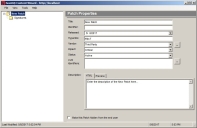The Patch Properties Page
The Patch Properties page allows you to view and edit the properties and fields associated with the selected patch.
To preview the patch description from within the Ivanti Content Wizard, click the Preview tab.
Tip: When creating a patch, provide as much information about the patch as possible.
The following list describes the Patch Properties page fields and properties:
|
Field Name |
Description |
|---|---|
|
Title |
Contains the name of the patch. The patch requires a title to display properly in your Ivanti Endpoint Security (Endpoint Security) server. |
|
Identifier |
Contains the vendor specific number or identifier value that uniquely correlates with the patch. |
|
Released |
Contains the date when the vendor released the patch. When creating a new patch, this field is set to the current date by default. This date should be changed to correspond with the date the patch was released by the vendor. |
|
Hyperlink |
Contains an optional link to more information. If a URL is entered in this field, the More Information link in the Vulnerabilities page within the Endpoint Security is visible. |
|
Vendor |
Contains the name of the company that released the patch. The drop-down list allows you to select from a list of vendors that are already in the database. |
|
Impact |
Indicates the level of severity for the patch. The various severity levels are listed in Understanding Patch Severity Levels. |
|
Status |
Defines the status of the patch. If set to Active, Endpoint Security users will be able to view this patch in the Patches page. If set to Beta, only Endpoint Security websites set for Beta use will be able to view the patch. |
|
CVE Identifiers |
Allows for the patch to be defined and classified using the Common Vulnerabilities and Exposures standard. See https://cve.mitre.org for more information. |
|
Description |
Contains a text description of the patch. The information is displayed in the Patches page of the Endpoint Security server as well. |
|
Make Patch Hidden |
Determines if the patch is hidden from the end user when deployed. The check box is cleared by default. |